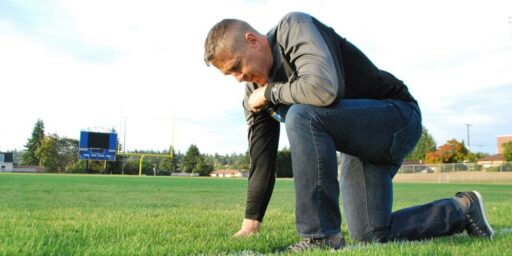Teaching History Backwards
Kevin Drum champions a teaching methodology for making history relevant to modern teenagers: teach it backwards.
[C]urrent events are intrinsically interesting, and learning about them make you genuinely curious about why the world ended up the way it did. If the lessons are structured with curiosity about causes in mind, this will make you interested in the Cold War, which in turn makes you interested in World War II, which in turn makes you interested in the Great Depression, etc.
That struck me as an interesting approach until I read Alex Massie‘s response. Building on Daniel Larison‘s contention that the approach fundamentally misunderstands both history and teenagers, Massey argues that,
History does not in fact travel along a straight line. It is not a series of linked events, each attached to its predecessor and successor in an endless chain that stretches back to the dawn of time. It’s risky enough moving forwards through history, suggesting that event A caused event B which in turn led to event C. To do so in reverse – C was caused by B therefore B was caused by A – is even worse. It betrays history.
Massie, whose experience with teenage history courses is from an elite Scottish boarding school, says one would have to be a “pretty rotten history teacher” to make history boring. Alas, he has never been in an American public high school, where teachers not only lack advanced degrees in their subject matter but are incredibly unlikely to have published cutting edge work in their field. “Coach” is a far, far more likely honorific for a high school history teacher than “Doctor.”
In some subjects, a reasonable technical knowledge of the subject is likely enough to get by at the high school level. I seldom had questions about chemistry, physics, or trigonometry that my college-educated teachers couldn’t answer, since I was mostly struggling to simply grasp the formulas under discussion. Conversely, there will generally be students with enough facility with and interest in history, politics, and economics that a teacher with nothing more than a few college credits in those subjects will simply be unable to answer. Teaching those subjects requires a deep passion and years of extensive reading. Expecting that from the assistant basketball coach is unreasonable.
Ultimately, it doesn’t matter which end of the timeline we start our history lessons if the teachers don’t know history.






I don’t see why teaching history backwards implies that history moves in a straight line. In fact, that is the way that much of science works, and I can assure Massie that many of the processes scientists study most assuredly do not move in a straight line.
In much of science, we start with the effect, and seek to understand the causes. For example, we ask why a person develops cancer, and go “backwards” from there. That does not mean the causes are simple or linear. The examples that Massie highlights are not weaknesses but simply mistakes that can be caused by going in either direction. There is nothing inherent about going backwards that caauses these mistakes to be inevitable.
The history teachers in my public school system tended to be the coaches for the various sports teams. I remember in one class our “teacher” simply had one student read aloud one paragraph of the textbook, then the next student would read the next paragraph and so on until the pages to be covered were read. In the meantime the teacher was busy drawing up plays in his playbook…
This no doubt explains the intense interest on the part of most teenagers in the United States in history, world geography, and politics.
Was Kevin Drum ever a teenager? It’s been quite a while since I was one but my recollection and observation of more recent teenagers is that they’re mostly interested in themselves and what’s being sold on TV and in the magazines. Perhaps that what he means by “curent events”.
History does not in fact travel along a straight line. It is not a series of linked events, each attached to its predecessor and successor in an endless chain that stretches back to the dawn of time.
But that’s how you teach it, to high schoolers at least.
I mean, come on — if you’re teaching algebra, are you going to digress into Godel’s theorems? If you’re teaching English, are you going to deconstruct everything?
You can’t teach history as an academic subject without making causal assertions, which are going to be more or less blatant at the secondary level.
I think you have to work at it to make history uninteresting. Even teenagers like to hear stories.
My history teachers were mostly coaches, too. They were the most intellectually uncurious teachers I ever knew.
However, there was one prominent exception: A 9th-grade history teacher who liked to focus on German and Russian history. He was an ex-Marine captain and Vietnam veteran who believed we needed to “know the enemy,” and he had his Russian history down cold. Also fluent in both languages (he taught the German class.) He taught a very interesting class — first history class I took that wasn’t a boring toss-off.
I don’t recall that he felt he had to teach history backwards.
Curiously, he was also a coach, but it was clear that it was coaching that was the secondary career, not the history teaching.
Years later I began to wonder why he had retired as a Marine captain and gone into teaching. The only hint was a remark he made one time to the effect that any officer who lost more than 10% of his men in an engagement in Vietnam was automatically sacked.
——————————
I sometimes wonder if education-as-sorting-mechanism doesn’t seriously interfere with education-as-teaching-mechanism.
I have great history teachers in college. But not in high school.
Oh and, Alex’s last name is Massie, not Massey. [So it is. I had it right in the link but subsequently reverted to the standard American spelling. Corrected now. -ed.]
I HAD great history teacher in college.
One of my best “history” teachers was my sixth grade teacher. I still remember many of his stories and the facts he stuck in our heads with them.
Teaching history backwards would seem more prone to the post hoc ergo propter hoc type of error than conventional approaches. It might also generate more problems of the nature of those usually resolved by the application of Occam’s Razor, given that our minds automatically construct models and there is little context offered for events until well after the fact. I’d also think that there might be some professional embarrassment at proudly announcing that, pedogogically speaking, you are doing things backwards.
As to your final paragraph, might it be that it is probably much easier for professors and TAs to answer questions based on objective arts and sciences than on subjective ones?
Going backwards is good for discovery, which is what you are talking about in your science examples. But explaining something requires starting at an earlier point and moving forward.
The goal I think Kevin Drum was trying for, that is, making history captivating by highlighting current events, is a good one. His process, making that the starting point, is where I think his argument falls apart. Rather, I think a specific event should be chosen as the target event to be explained, and then start from as far back as you want, moving forward until you have covered the events leading up to your target event. This lets you evaluate independent historical details while maintaining an overall objective of compiling them all into an understanding of the one chosen event.
For example, I once traced the series of events centered around Germany from Napoleon to WW2, which gave much more incite into WW2 than I ever got out of a history class in school.
I think teaching history as essentially a straight line is appropriate for the high school levle. Think of it as the skeleton which supports later, more nuanced, understanding. I suspect that teaching it backwards would help some kids and hinder others. Just as some people do betetr if they start with the big picture and drill down to the details and other do better the other way around.
Perhaps two different kinds of courses should be taught. Past forward and present backwards. If the kids managed to learn from just one of them that’d be better than what usually happens now.
Perhaps there’s something to this. Not necessarily teaching it backwards, but making it a more interesting story. The terrific PBS show “Connections” did this: It started with a current technology, then made a seemingly impossible statement that it was made possible by some seemingly inoccuous primitive idea – touchstones for determining the purity of gold leading to nuclear bombs. Then, having shown you where you’re going and proposed antecedent, it proceeded to fill in the gaps to show how it worked. That could be a great way to implement this idea for teaching history.